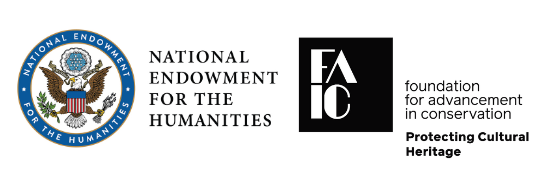The Foundation for Advancement in Conservation and the National Endowment for the Humanities Chart a Path for the Future of Cultural Heritage Conservation and Preservation

FAIC

FAIC
Washington, D.C. —The Foundation for Advancement in Conservation (FAIC) and the National Endowment for the Humanities (NEH) today released the full report for Held in Trust: Transforming Cultural Heritage Conservation for a More Resilient Future. Growing out of a four-year collaboration between FAIC and NEH, the report articulates a vision of a vibrant and resilient future for conservation grounded in social justice, equity, and environmental action, in which conservators and communities work together to preserve the rich cultural heritage of the United States. This work is of vital importance for the field and the public as the preservation of cultural heritage is indispensable to fostering a society where all of humanity is valued and flourishes. The Held in Trust report is available to download for free at culturalheritage.org/hit.
Held in Trust focuses on the intersection of conservation and preservation with critical areas of study, including environmental resilience, science and technology, inclusivity, equity, and collaboration in professional practice, education, philosophy, and ethics. The findings include actionable steps that can be taken by cultural institutions, communities, practitioners, funders, and supporting organizations to meet the challenges facing the conservation and preservation field and advance toward a positive future for our communities and nation.
Lissa Rosenthal-Yoffe, Executive Director of the American Institute for Conservation and the Foundation for Advancement in Conservation, stated, “An equitable, thriving future depends on the preservation of cultural heritage and the stories that objects and places tell us about humanity. Held in Trust provides the direction and inspiration to seize the opportunities before us and take action now, before even more cultural heritage is lost to the climate crisis and other threats. We are calling upon everyone who cares about preserving and protecting our irreplaceable cultural heritage to take the next steps with us. If you are in the field, read the report, identify ways you and your organization can create change, and share this resource with colleagues and collaborators. And, if you're not in the field, volunteer, support local institutions that are doing this work, and talk to your friends and neighbors about the importance of preserving cultural heritage in your community. This project would not have been possible without the support and dedication of our partners at NEH, who from the inception of Held in Trust shared our commitment to working together to help identify and solve these problems, and who champion the importance of conservation to the collective memory and everyday lives of communities across the U.S.”
National Endowment of the Humanities Chair Shelly C. Lowe (Navajo) stated, “From the early days of NEH, agency leaders understood the power of objects and the need to preserve them to better understand the past, present, and future. Beyond the firsthand accounts of historical events offered by letters, photographs, and diaries, objects tell stories. Garments worn and repaired, and repaired again, tell stories of hard journeys. Broken buildings and Plains ledger art reflect the horrors of war. Held in Trust seeks to explore a vision of what the future of conservation might look like, work that is important not just to the field but to our collective humanity, and our ability not only to preserve objects, but to tell the stories that tie us together. I'm thrilled to see the work Held in Trust has done and will continue to do.”
A critically important tool resulting from Held in Trust is the web-based project Climate Resilience Resources for Cultural Heritage: An Initiative of Held in Trust, which will be available in late 2023. This first-of-its-kind resource will provide interactive climate risk maps, learning modules, and pilot projects to help cultural institutions and heritage sites prepare for and mitigate climate-related environmental hazards and weather disasters.
Summary reports in each area of focus of Held in Trust can be found below:
- Climate Crisis and Environmental Impact
- Collection Care and Preventive Conservation
- Digital Technology: Research and Practice
- Diversity, Equity, Inclusion, Accessibility
- Education, Professional Development, Leadership
- Engagement, Communication, Storytelling
- Field Investment, Infrastructure, and Sector Health
- Philosophy and Ethics in Conservation
- Science and Materials
The initial findings of Held in Trust were presented at a National Convening at the Library of Congress on April 28. A full recording of the National Convening can be accessed on YouTube at this link.
About Held in Trust
Held in Trust is a cooperative agreement between the National Endowment for the Humanities and the Foundation for Advancement in Conservation and is part of the National Endowment for the Humanities’ A More Perfect Union initiative. Any views, conclusions, or recommendations expressed in project materials and findings do not necessarily represent those of the National Endowment for the Humanities.
About The Foundation for Advancement in Conservation (FAIC)
The Foundation for Advancement in Conservation (FAIC) supports conservation education, research, and outreach activities that increase understanding of our global cultural heritage. Our mission is to save cultural heritage for future generations, protecting it from decay and destruction. We advance research and education, lead treatment and collection care initiatives, and deploy conservation expertise to where it is most urgently needed. Our work empowers conservation professionals, strengthens cultural institutions, and engages stakeholders, including public audiences, as we work together to protect cultural heritage for humanity. Learn more at culturalheritage.org and follow FAIC on Twitter, Instagram, YouTube, and Facebook.
About the National Endowment for the Humanities (NEH)
Created in 1965 as an independent federal agency, the National Endowment for the Humanities supports research and learning in history, literature, philosophy, and other areas of the humanities by funding selected, peer-reviewed proposals from around the nation. Additional information about the National Endowment for the Humanities and its grant programs is available at neh.gov.
#
Media Contacts:
Hannah Holden / Shea Seery
Resnicow and Associates
@email / @email
212-671-5154 / 212-671-5173

